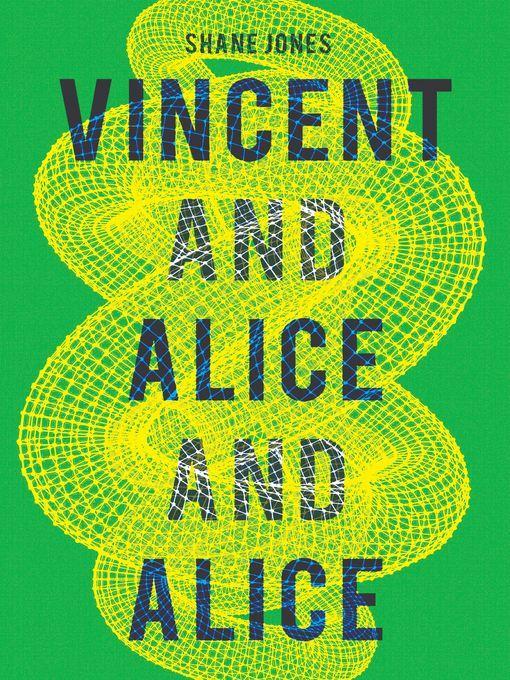
Vincent and Alice and Alice
- اطلاعات
- نقد و بررسی
- دیدگاه کاربران
نقد و بررسی

May 1, 2019
An artist-cum-bureaucrat gets his wife back (or a version of her) in Jones' (Crystal Eaters, 2014, etc.) fourth novel. It is a summer of thunderstorms and xenophobic unrest in A-Ville, but Vincent, a former painter who works for the state, hardly notices. He's reeling with depression because his wife, Alice--fed up with Vincent's emotional enslavement to the retirement package (still hypothetical and more than 20 years away) that keeps him from quitting his job and leaving A-Ville--has divorced him. Then Vincent is asked to participate in PER, a program run by Ronald Reagan worshipper Dorian Blood, who promises that PER will allow Vincent to "live a fulfilling existence while being a productive worker"; in other words, it will distort his experience of reality so that he can work with "stunning proficiency" while "physically interacting with the life [he's] always wanted." Vincent has reservations, but Jones wouldn't have a book if Vincent didn't acquiesce, so he does, only to discover that his ideal life consists of just one change: It includes Alice. An uneasy mishmash of social satire, moral fable, dystopian sci-fi, and love story, Jones' novel slides between the influential shadows of writers like Anthony Burgess, George Saunders, Philip K. Dick, and Don DeLillo while never quite cohering into a convincing shape of its own. This is, in part, because the world--a twist and shake different from our own--feels incompletely built. PER Alice, for example, is never quite convincing as an entity, mostly because we don't know the metaphysical rules of her existence: Sometimes she's visible and audible to others--when she answers the telephone, her words are heard--and yet she's also a nontangible figment of Vincent's memory. Similarly underdeveloped are A-ville's violence and racism, the existence of which would powerfully indict Vincent's solipsism--people are attacking Muslims while he perpetuates his fantasies and earns his pension--if the scenes that describe it, which are jocular and cartoonish, didn't feel written solely to have exactly that moral effect. However, Jones is an acute cultural observer and a very funny aphorist--"Anger is lazy"; "Men are brave but only inside cars"; "Everything makes sense if you let it";--and his book, despite its faults, contains many delights. An intelligent, entertaining, and yet unconvincing mashup of Office Space, A Scanner Darkly, and A Clockwork Orange.
COPYRIGHT(2019) Kirkus Reviews, ALL RIGHTS RESERVED.

May 27, 2019
The narrator of Jones’s uneven novel (after Crystal Eaters), an everyman named Vincent, is pushing 40 and nine years into a mind-numbing state job that will yield an exceptional retirement package as long as he stays for 30 years. He’s recently divorced from his wife, Alice, an idealistic nonprofit worker who could no longer stand the banalities of their life together, no matter that Vincent is still in love with her. Unable to be fully present at work in the aftermath of the divorce, Vincent enters the mysterious Patrol for Everyday Repetition (PER) program, led by the enigmatic Dorian Blood. PER promises a way for Vincent “to live a fulfilling existence while being a productive worker.” In other words, as Vincent embraces the monotony of capitalism, he will be rewarded by a tangible manifestation of his ideal life, which will eventually “overlap then blanket reality.” For Vincent, all that means is having Alice back. Though PER initially seems to work, reality keeps intruding on Vincent’s life: he loses his dog, his only friend goes missing, and finally the real Alice reappears. Jones is an imaginative writer, capable of astute observations about capitalism and desire, but the execution never quite lives up to the ambition of the concept. This is an entertaining effort, but it may leave some readers unsatisfied.

June 1, 2019
Vincent is a classic American office bureaucrat: going through the paces, forgetting to bring cupcakes to the office party, and determined to work long enough to get the retirement plan. His wife, Alice, has left him; his only real friend is a quirky local man, Elderly, who lives in a car; his new dog is stolen. When the CEO of a company called PER approaches him with a program that can fix the drudgery of office life by making workers happier and more productive, Vincent decides to buy in, only to find an Alice?but not his Alice?waiting for him when he gets home. Jones (Light Boxes, 2010) has written a strange, trippy allegory about what it means to be happy in the present moment. The novel is a warning against new technologies that try to adapt the mind and happiness of the worker to the standard office space instead of trying to transform the office itself. Jones twists us through the absurd, funny world of bureaucracy, all while hinting at a broad despair floating behind the curtains.(Reprinted with permission of Booklist, copyright 2019, American Library Association.)




دیدگاه کاربران